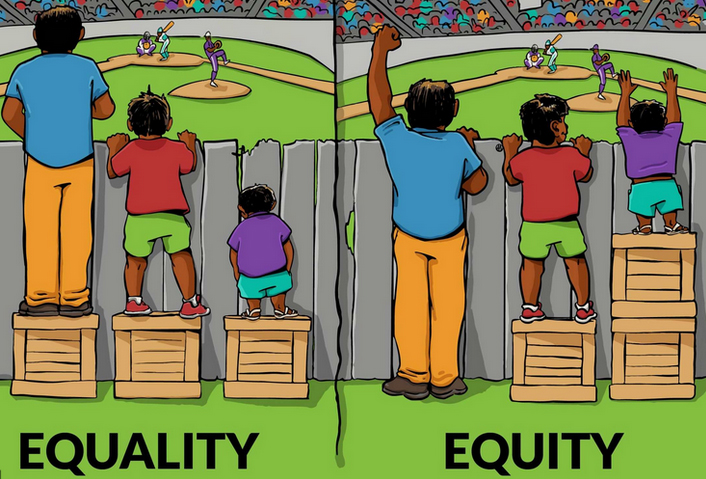If you want to succeed in your career, being great at your work isn’t enough. Be someone people will enjoy working with because you see their point of view.
You don’t have to be best friends with everyone.In all areas of life, we will get along with some people better than others. However, take steps to understand everyone you interact with and treat them fairly. This will go a long way towards making you the kind of coworker everyone wants in their team.
Fortunately, these are skills you can learn. No-one is born with them. Let’s look at a few strategies to help you!
Treat people how they want to be treated
When you were growing up, were you told “treat others how you would want to be treated?” This is fine advice… up to a point. Yes, most people would like to be spoken to kindly and would not enjoy being made fun of.
However, treating others how you would want to be treated isn’t always the right answer. Why? Because people are different and have different preferences.
Sometimes, how you would want someone to treat you might feel invalidating or even unsafe to someone else.
Here’s an example. When he is in a situation of conflict, Steve likes to talk it out as soon as possible and come to a resolution. However, Mary prefers to think things over by herself before having a conversation. If Steve and Mary have had a disagreement, Steve might sincerely believe he is doing the right thing by asking Mary to sit down with him and talk it out straight away. This is what he’d want someone to do for him, after all! But to Mary, this feels like a lot of pressure when she would rather regroup and then have a conversation tomorrow.
If Steve asked Mary “how would you like to proceed?” and allowed her the space she needed, he is treating her as she would like to be treated. Do you see the difference?
Remember that “fair” doesn’t mean “the same”
People often fall into the trap of thinking that to treat others fairly, you have to treat them all the same. In fact, people are so different that it’s almost impossible to find a one-size-fits-all way of interacting with others.
Of course, everyone should be treated with respect and courtesy. But what fairness looks like can vary greatly depending on people’s individual needs. For example, employers in the UK are legally required to provide reasonable adjustments to allow disabled employees to access and flourish at work. This might mean treating them differently from others, perhaps by adapting their job duties, working space, or working hours to be more accessible to them.
Treating everyone the same can actually place certain people at a disadvantage, especially those who are marginalised in some way already. Focusing on individual needs is far better.
Equality focuses on treating everyone the same, while equity is about giving everyone what they need to thrive. Here’s an illustration that beautifully sums it up:
(Source)
Remember contextual differences
One of the biggest strides you can make in understanding others is to get to grips with this important fact: not everyone sees the world or experiences things the same way you do! Our personal situation and background can make a huge difference in how we view things. Things like upbringing, education, race, religion, gender, and past experiences are just some of the factors that can affect the ways we think and feel.
Remember that you can’t always tell what factors might be at play just from looking at someone.
When you’re not sure, never assume anything. Instead, ask!
Remember that understanding doesn’t mean agreeing
- You don’t have to agree with somebody to understand and respect their point of view.
- When you express your views, your goal shouldn’t necessarily be to bring others around to your way of thinking.
The workplace thrives when it contains a diverse array of people who think in lots of different ways. This is a good thing! Life – and work – would be very dull if we were all the same.
Therefore, instead of thinking that you and your colleagues must always agree, strive to come to a place of mutual understanding that allows for differences of opinion.
Practice active listening
Communication is at least as much about how well you listen as it is about what you say. How good a listener are you? Do you pay attention actively, or are you always just waiting for your opportunity to jump in and start speaking again?
A key step in understanding others is in how well you listen. When someone is speaking to you, give them your full attention. It’s also good to check your understanding by paraphrasing what they’ve said back to them to make sure you’re hearing them correctly.
Always be kind
Sometimes it can be difficult to come to an understanding with someone. That’s okay and doesn’t necessarily mean either of you is doing anything wrong. If you’re ever in doubt about the best way to interact with someone, you can never go wrong by prioritising kindness and compassion!
Activity:
Think of someone you know somewhat, but not very well. A classmate or colleague is ideal. Write down five things you know or think you know about them. Now look at that list – how many of those things do you know for sure, and how many are assumptions? Next time you interact with that person, make a conscious effort to really listen and pay attention to their body language, tone, and words. What can you learn? You might be surprised! The point of this exercise is that a huge piece of the puzzle of understanding other people is simply to pay attention.














